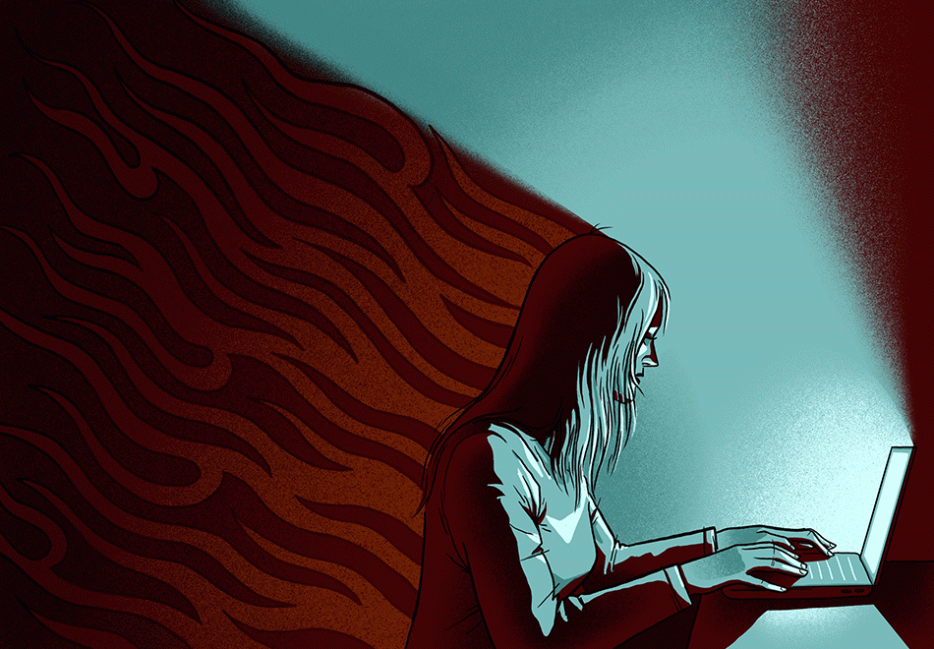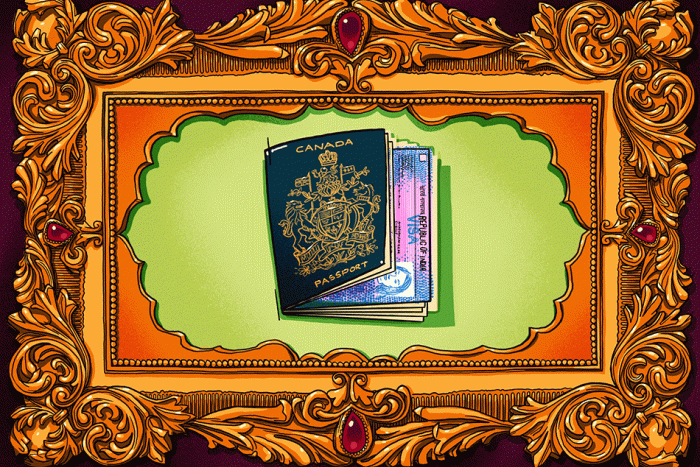What were we obsessed with, invested in, and beset by in 2022? Hazlitt’s writers reflect on the issues, big and small. Keep up with this year’s series here.
This past year you had a second baby and wrote a book.
You knew it would be difficult, but also you knew you could do it. Because if your first kid taught you anything, it’s that your threshold for pain is boundless. Joy too, it turns out, but that wouldn’t help you write the book.
You’ve been a stay-at-home mom since July 2020, when your mat leave with your first kid ended smack dab in the darkest thick of the pandemic. When toilet paper was scarce, and groceries—handled in separate clothes—were scrubbed down at the door. Daycares were closed at that time, but even if they weren’t, the idea of relinquishing your baby to a squall of respiratory droplets smothered you in panic. So, like many other mothers at the time, you decided to quit your job. Just for a little while. Until things got better. Because they had to get better eventually, right?
You felt a certain unease about becoming a stay-at-home mom, of course, even just temporarily. Like a dog, cautiously following a hunk of cheese into a crate.
But you also knew that you were very lucky. Very, very, very lucky. To have had the option to keep your child safe during one of the most frightening and uncertain periods in recent history.
This is a good thing, you reminded yourself as you Clorox-wiped a swing at the park for the two-hundred-and-thirteenth day in a row. You are very, very, very, very lucky.
*
And then sometime between May 21 and June 21, your second baby is born. He quickly dissolves a lifetime of prejudice you’ve built up against Gemini men. He is a decent sleeper. An amazing eater. Breathtakingly cute. He’s somehow polite. Even his dumps are civil.
A friend of yours, a software engineer who you admire very much, had quit her job around the same time you did. Her two sons were falling behind in school. Online learning was a disaster. It was either her career or her children’s education, as far as she could tell. And you totally understood.
Her husband was also a software engineer, but of course he made more money than she did.
Not a ton more, she’d said over text. That’s not the main reason. It’s just easier if I do it.
The two of you text constantly. You share articles about other women, forced from their jobs by the pandemic’s relentless caregiving demands. She comes across the term weaponized incompetence, a behaviour pattern in which one partner pretends to be bad at simple tasks to get out of shared responsibilities. Learning about this term is a genuine danger to her marriage.
Um, have you heard about this? Is that what he’s doing to me? Am I being fucking gaslit?
Her rage is escalating. You let her vent. The text thread, this secret, sacred space, is the best place for it.
He'd have to be a criminal mastermind to be manipulating you to that extent. And let’s face it, he’s no mastermind lol he can’t even homeschool the kids! Anyway it’s only temporary. This is going to pass. And when it does you’ll find something else. Something better. You didn’t even like that job, plus they obviously weren’t paying you enough.
This is the first time you notice yourself doing it, a service you’ve been performing unconsciously for years: deescalating another woman’s rage. This service has been performed for you as well, by this very friend in fact. Because you’ve both been trained to believe that rage will only hurt you. A woman enraged will be perceived as hysterical. Mad. Unfit to make her own decisions. A woman enraged is unattractive, unlikeable, unfeminine. She is transgressive. She is too big. Too selfish. Too entitled. Too much.
Who does a women enraged think she is?
You raise your fingertips to your head as though searching for an implant, some insidious rage stabilizer plunged between lobes before you were old enough to protest.
And like a good-natured orphan from a holiday special, your friend has trained herself to be satisfied with very little. This small portion of rage has done the trick. Like a treat.
Treats: things women earn by suffering.
By enduring some form of socially acceptable torture. Like starving. Or Pilates.
You recall the term push present—a gift from a husband to a wife after she ejects a baby from her body—and your stomach turns.
Do men have these complex and deeply personal suffering/reward algorithms baked into their brains?
Or are they simply entitled to everything already. Empowered by their rage.
*
Every night you write on your phone in the dark while Gemini eats or sleeps soundly in your lap.
Every day you write on your laptop, standing at the kitchen counter while Gemini sleeps in the carrier.
Your lower back will never be the same.
Gemini’s face is so squishy you could die. But no time for that.
Every night you edit the day’s work in bed.
Every night Gemini wakes up hungry.
Every night you write on your phone in the dark while Gemini eats or sleeps soundly in your lap.
Again and again and againandagain andagainandagainandagain.
A male writer has never had to do this. It’s not their fault—it’s just a fact. A male writer has never written a book with a strange creature latched to his body 24/7, draining him of milk and energy.
You are on track to meet your deadline.
*
Another friend texts: Have you heard this term “she-cession”?
It’s a word used to describe the record number of women pushed out of the workforce during the pandemic. By the demands of sick children and relatives; by the hot mess of online learning; by insidious social messaging that we are the default caregivers; by the weaponized incompetence, whether conscious or not, of men who’ve been tapping us for free labour since the dawn of capitalism; by the wage gap, which leaves us making less money than our male colleagues.
You reply with another term you’ve seen popping up: Forced domesticity.
This particular friend of yours is suspicious by nature. When Roe v. Wade is overturned the following summer, she is not at all surprised.
First they take away our financial independence, now they take away our bodily autonomy. What better time to deliver this blow than now when, what, over a million more of us have become financially enslaved by them?
She references The Handmaid’s Tale, as she often does.
And you wonder if you’ve been naive.
You peer warily at Gemini.
At your husband. A fun and reliable and wise father. Spectacularly competent. And so, so supportive. The most supportive. Isn’t he? Isn’t he?
You don’t have time for this.
*
Another friend, a writer and mother who knows very well what you’re up against, texts periodically: just keep swimming!
You appreciate it every time. You love her so much. You haven’t seen her in literal years now. You haven’t seen any of your friends. There isn’t a vaccine available for children under five yet, so even though the world is moving forward you’re all still housebound. Buried alive. Texting. Texting.
You are somehow on track to meet your deadline. Actually not somehow. You’re meeting it because you have to meet it. Because your threshold for pain is a miracle. Nothing can kill you. You are proud of this. And why shouldn’t you be!
*
The holidays are a lot of work. You seethe, thinking about how many women will be receiving socks that say “If you’re reading this, bring wine” on the bottoms. Or, god forbid, charm bracelets from Pandora with their kids’ birthstones on them. Because no one really knows their mother. All they know is whether their mother is sassy (socks) or sincere (bracelet). You text a friend about this. She says LOL followed by a sad face.
The holidays are also the best. It’s especially snowy this year. A thick layer of sparkling buttercream whipped by the wind each night into something new each morning. The kids notice every detail. They bang on the frosty windows for you to look too.
Despite being busy beyond all reason, you somehow carve out time to rewatch While You Were Sleeping. You are mildly amused to learn that the man who directed it, one Jon Turteltaub, went on to direct Phenomenon the following year. Despite finding it only mildly amusing, you suspect you will never forget this fact for as long as you live.
Turteltaub.
Probably a perfectly nice man.
Turteltaub.
He’s directed plenty since Phenomenon. He directed National Treasure, Instinct, The Meg. Meanwhile Elaine May, a bona fide fucking genius, directs one flop and can never direct again. Plus Ishtar wasn’t even that bad. You’d watch Ishtar any day of the week over Phenomenon for god’s sake. Instinct? Please. National Treasure’s not bad. Didn’t see The Meg. You text the only friend who will care about this.
She says: Mikey and Nicky was a commercial flop too, in fairness.
You say: Seems like things have already been plenty fair for old Turteltaub.
You are, of course, on track to meet your deadline.
*
You submit the second book.
There must have been a treat but you can’t remember what it was.
Gemini is a year old.
This past year you wrote a book, but also you finally gave yourself permission to be as frivolous with stickers as the kids are. It felt incredible. It feels incredible. The effect on your mood, your life, has been unexpectedly profound.
The three of you made pinwheels and you’ll never, ever forget the looks on their faces that such frantic geometry had once been paper.
In the wagon, when their little bodies react to the cracks in the sidewalk you must restrain yourself from dislocating your jaw and devouring them both in one bite.
They are just so good.
You really are so very, very, very, very lucky.
*
You’re asked to create publicity content: essays, interviews, short videos. You’ve had requests to see your workspace, to reveal your writing rituals. Ha!
You’ll be touring the book in the UK soon. You’re visited once again and as always by guilt. Your husband is consistently dumbfounded by this reaction. It’s work, he says logically. You don’t have a choice. I get missing them, but you shouldn’t feel bad.
You talk to a friend, another mom, who has had to travel a lot for work, and this friend, paradoxically, expresses guilt about the fact that she feels no guilt at all.
Without warning an ugly spark of judgment flickers in your mind. YoU dOn’T fEeL gUiLt? ArE yOu EvEn A mOtHeR? Quickly you trap the vile spark between your palms, bring your eye to the natural peephole formed by the bangin’ curves of your thumbs. This spark, this thought, it is not native to your psyche. Another implant. Like when you’d talked your software engineer friend out of her rage. Part of your programming to maintain the status quo, to keep other women from the freeing power of their rage.
When you’re in the UK you think about this miraculously guilt-free friend. You drink to her. You try to channel her. And it works.
*
You’re scheduled for a lot of interviews. All of the interviewers are very good. Very conscientious. They know not to ask you about your children. Until male creatives or entrepreneurs or CEOs are asked the question of how they juggle work and family, female creatives and entrepreneurs and CEOs shouldn’t be asked either. To ask is to normalize the assumption that women are primary caregivers.
And yet somehow, even though the interviewers have stopped asking, the problem persists!
Your suspicious friend would ask who it serves, really, to avoid the question of how working mothers do it all. Who benefits from keeping these details hidden? Buried in the text threads of you and your friends. Moms and their friends. So many secret catalogues of rage, but not rage. Not exactly. More like rage testing.
Should this enrage me?
Can I feel rage about this?
I’m really very lucky. I know I’m very lucky. I’m so lucky I don’t even really know how lucky I am.
You are lucky and you are full of rage. You should use this platform to tell the world about The Rage.
But also, and mostly, you are petty. And tired. All you really want anyone to know is how hard you worked this year.






